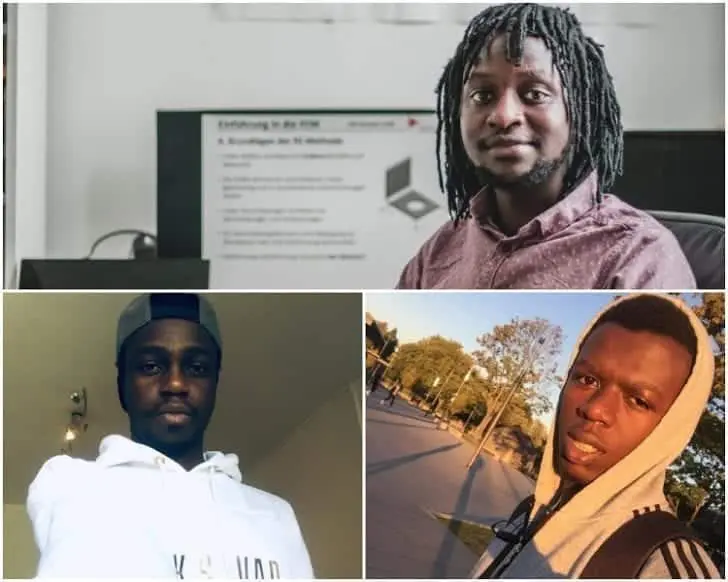Kenyans in Germany speak of hard times due to Covid-19

Moses Githinji went to Germany as a volunteer in 2012 but later joined university to study Mechanical Engineering.
He is currently a postgraduate student pursuing the same course.
Githinji says the rising cases of the coronavirus in Germany has hurt their way of living, especially the international students, who have been depending directly on jobs.
“It was a matter of time until it reached us Kenyans who live here. Examples of these jobs are waiters and waitresses,” Githinji told the Star.
Francis Ajevi is one of the students who have been confirmed to be having the virus. Ajevi, who will be turning 22 in July, is currently residing in Mainz.
“I started experiencing symptoms on March 23, such as headaches (which I took a pain killer for), slight fever, and I had caught a cold (I only took lemon water regularly for that),” he says.
Two days later, his friend, with whom he had physical contact, showed similar symptoms, only that his were more severe.
“Only the cold and headaches were recurring symptoms for me. Though I developed general body weakness later but only for two days. Until then, neither I nor my friend suspected we had contracted the virus,” Ajevi said.
“We mainly thought of it as maybe spring allergies or body reactions due to change of weather, given that we experienced fluctuating temperatures of between -1 to 11.”
After he was informed of his status, he was asked to stay at home since he lives alone, but the doctor did check-up calls on him every two days.
As of April 12, he was no longer in quarantine, but he still stayed home because he had to test negative twice before being given a clean bill of health.
“I had to inform my close friends and neighbours of my situation for their safety and for their help in case I needed shopping, medication or anything,” Ajevi said.
“They came in very handy with what I needed, and we heeded the regulations set to curb the situation. They left whatever I needed at my doorstep and I’d refund the cost via online banking.”
FOCUS ON HEALTH
Ajevi said it has never been clear to him when, how and from whom he contracted the virus, given he was in supermarkets, ATMs and trains.
His advice to Kenyans is they should get fewer negative updates about the pandemic and instead concentrate on their health to get better.
He said situations vary from one individual to another and patients react differently to the infection. One may or may not experience the same or different symptoms or even none (hence being just a carrier).
“Not everyone’s case gets critical. It’s not as fatal as it seems or is thought of,” he said.
Kevin Wanjala, 21, tested positive for Covid-19 on April 2. He started experiencing symptoms on March 25: a fever, sore throat and headache, as well as a cold at some point.
He thought it was because of the weather, which was at -1 degrees Celsius, hence decided to dress warmly.
“That same evening, I went to Ajevi’s house and I could not feel any scent of the air freshener that was on and it always had a strong scent. I measured my temperature and it was at 37.2 degrees Celsius.
Wanjala says despite feeling energetic the following day, he was still experiencing the symptoms.
He took his temperature and it was at 38.1, so he decided to go to the doctor the following day on Friday.
He called a doctor and explained the symptoms to him. At that time he was experiencing neck and back pain as well.
“The doctor prescribed some medicine to help relieve the back and neck pains. I was to report back to him in case any symptoms persist. Since I had the same symptoms, I decided to do the corona test on April 1,” he said.
The doctor inserted a special cotton swab in his throat and took a sample of his saliva. His friend, who happened to be around at that time, also decided to do a test since he also felt like he had a slight fever and a headache.
The following day, the friend was called by the doctor at around 4pm and informed that he was positive.
“I had my thoughts and also concluded that if he tested positive, then I am also positive. I decided not to leave the house until affirmed that I am negative,” Wanjala said.
At around 10pm the same day, Wanjala received a call from the doctor, informing him that he had also been found to be positive.
He said he was not shocked since he was expecting the news.
“The doctor told me everything would be okay since I was young and energetic. He asked if I had any other underlying health issue, such as asthma, diabetes or any lung problem. Luckily, I have no health issues since I dedicate most of my free time to sports,” Wanjala said.
I was calm but the people I informed were getting afraid and they told me they will start taking the precautions seriously and they will keep me in their daily prayers
SLOW RECOVERY
The doctor told him measures to take to prevent Covid-19 from getting worse.
He was told to stay at home for 14 days and avoid contact with anybody. He would always be contacted by the doctor daily to check on his progress and was advised to make a call in case he experienced any issue, irrespective of the time.
“After the call, I was worried for a minute because of the news I had heard about the virus. A deadly virus. I got the courage to clear my mind from those thoughts and got back to being myself, always jovial,” Wanjala said.
He then informed his family and friends and assured them that all was going to be fine, while at the same time advising them to take care and spread prevention regulations with friends.
He said most people were asking if he had any difficulties in breathing or if his fever was high, with some thinking the virus might kill him.
“I was calm but the people I informed were getting afraid and they told me they will start taking the precautions seriously and they will keep me in their daily prayers,” Wanjala said.
He said fear is a factor that should be avoided when one hears about the virus because it can make someone be depressed, and with depression, the health deteriorates, lowering chances of survival.
At some point, he felt as if he was breathing in hot air. Even though he was not sure what that was, he did not raise any alarm since he was not experiencing difficulties in breathing.
Despite the fact that he is fine now, he has lost his sense of smell.
“Most of the time I am tired and experience some mild headaches. In case I need shopping, a friend of mine does that for me and delivers it to my doorstep. I have not seen anyone or been outside since April 2,” he said.
The good thing is that the doctor contacts him daily to note down any new symptom that might have appeared or any that have disappeared.
Just like his friend Ajevi, Wanjala has no idea how he contracted the virus.
LESSONS FOR KENYA
Even though the Covid-19 pandemic hit Germany hard, the percentage of fatal cases has been remarkably low compared to its neighbours.
Below are some of the explanations the Kenyan students have on what Germany did differently that Kenya can learn from.
Wanjala, Ajevi and Githinji say as people who have had first-hand experience, their advice to Kenyans is to always sanitise their hands, avoid unnecessary contact with people, observe general hygiene and above all, pray.
They said it is not easy to tell when you have the virus since it exhibits differently from one person to another.
They didn’t have any severe complications, so it would have been easy to ignore and take it for a normal cold.
They advise that Kenyans should not take any chances. If anyone suspects themselves, they should stay at home or alone in their room if they live with a family. In case of anything weird, it is important to contact a health care provider.
In addition, they advise that people desist from developing fear, saying what you have seen happening to other people in the news will not necessarily happen to you.
“What I think is a mistake we are doing, in my country Kenya, is how we are handling the people,” Wanjala said.
“The rule of having a mask is okay, but you have to remember most of the people will wear the same mask on a regular basis. An appropriate mask only prevents saliva from spitting, but it can also carry the virus.”
The students said that for police to arrest people and squeeze them into one place is another mistake, adding that the police should be notified that by doing so, they can also contract the virus.
Any queues should also be a metre apart from person to person, regardless of the place, failing which a fine is charged.
“At this time, everybody is trying to help each other, but it is also better if we start by helping ourselves by avoiding any unnecessary contacts and helping to spread the message,” Wanjala said.
The students emphasised the importance of self-discipline, noting that as citizens, it is important to make the work of the government easy by abiding by the rules.
Wanjala said as a patient, he was taking hot drinks, especially with lemon. Neither did he use any medications, such as painkillers, but he managed to beat the virus by following the rules.
“We only need common sense to beat this virus,” Wanjala said.
He treated the virus as a normal cough. He has always avoided watching any discouraging news about coronavirus deaths.
On the matter of racial discrimination in China, the trio said it is their prayer and hope that the government will take action.
They said in Germany, no Kenyan or African has been discriminated against because of Covid-19.
In addition, they urged the government to help Kenyan students financially, even as the German government tries to work on the consequences of the pandemic.
They said most international students, including Kenyans, are facing financial problems. Due to the closing of the entire economic sector, many of them lost their jobs.
BY MAGDALINE SAYA
Edited by T Jalio
Source-the-star.co.ke
23-year-old Kings, Kenyan living in Germany shares his fight with the Coronavirus
Kenyans in Germany speak of hard times due to Covid-19







